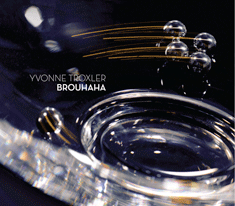

 |
 |
|

Troxler Brouhaha etc Glass Farm Ensemble Innova 835 Yvonne Troxler is a versatile composer/pianist, successful in New York and Switzerland. Brouhaha, the title track, has three glass bowls played with marimba mallets and ball bearings, to simulate the effect of coins rolled inside ceramic bowls. In this piece the violin and cello 'substantiate and continue' the sounds of the glass bowls. Shegotty develops from martian meteorites (!) a track with three percussionists making magical music with small stones and other special effects like found objects, pure and entrancing. Penn 1 (2006-2011) is inspired by hearing music, not just noise, in the sounds of a big city from a building in Manhattan. Susurrus explores simultaneous overlays and Kaleidoscop for saxophone, guitar, percussion and piano manipulates a single line in various ways, with notes so close that they create a subtle beating; fascinating. Strongly recommended. Peter Grahame Woolf OLKIEWICZ
works for flute by Wroclaw composers ROGALA WISŁOCKI PSTROKOŃSKA-NAWRATIL SZAJNA-LEWANDOWSKA GĄSIENIEC Grzegorz Olkiewicz (flute) Mirosław Gąsieniec (piano); *Teresa Worońko (piano); +Maria Szwajger-Kułakowska (piano); #Andrzej Jungiewicz (piano) Dux 0826 Many (too many) primarily orchestral musicians nowadays seek to put down recordings as soloists.. Whether (and where) they get reviews is something of a lottery, at several stages; we all receive too many review copies (se xxx for problem of lengthy lists). Some of them find their best sales at their gigs. Musical Pointer's primary criterion is repertoire; Gregorz Olkiewicz (and Dux) score here with repertoire. This CD concentrates on 20th C composers from Wroclaw, which holds the Musica Polonica Nova festival, with local composers well represented; an impressive and varied group, as evidenced by these flute/piano duos, none of them known yet in UK? Rogala explores sonoric and articulatory possibilities of the flute at its limits with Orientalist arabesques. Wislocki's attractive diverse short preludes hark back to the Baroque as does Szajna-Lewandowska's "thoroughly modern" sonatina relate to classical form. Grazyna P-W's Eco (these Polish names are really daunting for us) uses electronic delay effectively. Gorlich's 12-tone pieces wear their learning lightly and Gasieniec brings fresh energy to his Spanish Dance, the whole making a satisfying recital for playing straight through. Peter Grahame Woolf Beaser & Bolcolm song cycles Paul Sperry tenor The New York Virtuos/Kenneth Klein The St. Paul Chamber Orchestra/Dennis Russell Davies Innova 815 These feature Paul Sperry, a very accompllshed and widely recorded tenor, whose voice is as distinctive as Peter Pears', much of whose repertoire he shares. There is no linguistic barrier and both cycles ought to have flown across the Atlantic before now, firstly perhaps to College vocal departments. Bolcolm, perhaps the more often heard in UK as an accompanist, has set intense and notable poems by Theodore Roethke which repay close study; their presentation here is essential and they need to be read with the music, which in turn definitely deserves a second hearing. Most immediately striking is the Meditation of an Old Woman from a famous Roethke poem which combines elegant form with '30s pop-diction "sincere and winking" together, in the music too. Blazer's Montale cycle (1985), the text written in Switzerland, consisting of five Motets plus Autumn Cellars, is built from dense pre-2nd World War poems which need to be studied despite Sperry's admirable diction. They are of a calibre fully comparable with Britten's greatest, such as the Michelangelo Sonnets, also set in Italian (Blazer has his first and last in English, presumably to encourage access for American audiences) ? An inspring and rewarding release. Peter Grahame Woolf |